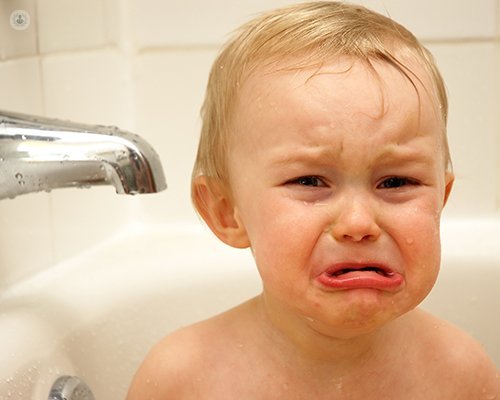Why is my baby crying constantly?
Written in association with:
All children cry. But when your child is crying excessively, and you don’t know the reason why, it can be very stressful and upsetting. Children cry for a reason, but they can’t tell you the reason they are upset, especially when they are newborn. Crying is the only way they are able to communicate a problem or a need.

Crying newborn: Why do babies cry excessively?
There can be multiple causes for your child to be crying so much. It is usually common in children younger than 1-year-old, especially as they have no other way of telling you that something is wrong.
Here are some of the reasons your baby may be crying excessively:
- The baby is hungry – The most common cause of an excessively crying baby is hunger. You should always make sure that you are feeding your baby a healthy amount.
Sometimes babies may not be getting enough milk, and fail to gain weight correctly. If you're concerned about your babies weight gain, always consult your GP or paediatrician.
- The baby is too hot or cold – Babies will often cry if they are not at a comfortable temperature, or if they are wearing comfortable clothes. This can be easily solved by ensuring the room is at a comfortable temperature, or that the baby is wearing enough comfortable clothes.
- Wet or dirty nappy – it may be obvious, but a wet or dirty nappy can cause babies a lot of discomfort, causing them to cry a lot of the time. Make sure your baby always has a clean nappy, and don’t leave a dirty nappy on the baby for a long period of time.
- An indication of an illness – some of the most common causes of persistent crying in a baby is an illness. Common illnesses that affect babies include:
- Colic – the condition that causes excessive crying in babies that are only a few weeks old, and usually stops after the baby is 4 months old. This problem usually passes, and is nothing to worry about.
- Blocked nose
- Ear infection
- Urine infection
- Gastroeosophageal Reflux Disease (GERD). This is a common condition in children in which food and stomach acid travels back up the food pipe towards the throat, causing pain in babies like heartburn. This can be avoided by regularly burping your child after feeds, and allowing the baby to sleep with its head raised to around 30 degrees. This can be done by placing 2 pillows beneath the mattress at the head end. Feed thickeners or anti-reflux medicine can also be used.
- Some more serious but rare conditions can cause excessive crying, such as meningitis.
If you are worried about excessive crying in your child, you should see a specialist paediatrician who will be able to advise on the most appropriate course of action. If your baby is crying excessively and has fever you should see your GP as soon as possible as this may be a sign of a more serious illness.


